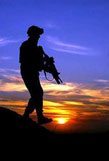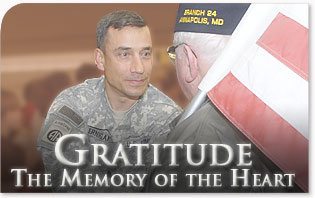 Gratitude, it has been said, is the most fragile of virtues. This virtue’s feebleness was nowhere more apparent than in the treatment given to American soldiers returning from the Vietnam War. They were sometimes spat upon at airports by fringe groups of hippies.
Gratitude, it has been said, is the most fragile of virtues. This virtue’s feebleness was nowhere more apparent than in the treatment given to American soldiers returning from the Vietnam War. They were sometimes spat upon at airports by fringe groups of hippies.
Times have changed. American soldiers returning from the Middle East are given a more sympathetic welcome by large groups of Americans who remember the Vietnam War and vowed never to allow such a thing to happen on our soil again. In a nation that produced the ungrateful pacifist hippy movement of the sixties, today’s heroes’ welcome is yet another paradox that exists “only in America.”
First-Class Treatment
During a recent flight out of Chicago, I had the chance to witness this gratitude firsthand. As the last passengers were boarding, I noticed a soldier in camouflage being seated in first class by a courteous stewardess. Something told me that he was not a paying first-class customer. My suspicion was later confirmed when the soldier admitted he was upgraded. “That is the second time it happened to me on this trip,” he said with a smile.
This is a common sight. On a flight from Atlanta to Chicago, a businessman sitting in first class asked a boarding soldier which seat he was sitting in. The unsuspecting soldier responded, “23-B.” “No, son, that’s my seat,” the businessman replied. “Yours is in first class,” he said, before making his way to coach.
Other first-class passengers quickly followed his lead until soldiers occupied twelve of the fourteen allotted spaces in first class. The remaining two first-class passengers wanted to give up their seats also but there were no more soldiers.
Flight attendant Lorrie Gammon said the soldiers barely knew what to do. “They spent the whole flight saying thank you,” she said. “But we should have been saying thank you to them for what they’re doing for us.”1
A similar thing happened on a flight out of Phoenix when an attendant informed a soldier sitting in coach that a lady in first class wanted to trade places with him. Gil Anderson was seated in the area and after witnessing the scene, spontaneously applauded the gesture and was quickly joined by other passengers nearby. “When the lady came back to our area,” he is quoted as saying, “I had a tear in my eye.”2
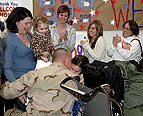
A Personal Experience
When my above-mentioned flight touched down in Baltimore, I made my way to the baggage claim where I saw in the distance a large group of cheering people gathered at the international arrivals terminal. They were patriotic Americans who had taken time out of their busy schedules to welcome tired soldiers returning from distant wars. Although I had heard of such homecomings before, I never actually witnessed them. What most impressed me was their genuine enthusiasm. Old and young wore red, white and blue, and exhibited a passion one would expect to find only at a high-school pep rally and not at a busy airport.
As I looked around me, I noticed what appeared to be other passengers and airport employees who stopped and looked. Their discreet smiles and the almost perceptible chill running down their spines showed that they were as moved as I was to see such an event. They seemed to be drawn in by the flag-waving, hugs and tears showered upon tired warriors reaching the end of their long journey home.
There is a French proverb from Jean Baptiste Massieu (1742–1818) who said, “La reconnaissance est la memoire du coeur” (Gratitude is the memory of the heart). This welcome seemed to me to come straight from the heart.
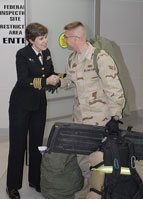
Operation Welcome Home Maryland
The hundreds of people who were on hand that day as I passed through Baltimore Washington International Airport (BWI) were part of a group called Operation Welcome Home Maryland founded by Captain Kathy Thorp, a Navy nurse. She was inspired to start her group after seeing an Anheuser Busch commercial3 which portrayed soldiers walking into a busy airport. A solitary passenger began an applause which quickly turned into a standing ovation for the returning warriors. The final words of the commercial were meant to express the gratitude of a nation: Thank You.
Kathy Thorp never forgot that commercial and has transformed its emotional message into a vivid reality. It all began with a simple email inviting some friends to join her in welcoming home a Navy Medical unit scheduled to arrive at BWI. She was pleasantly surprised when over 100 people showed up.
Among them was Mr. John Flynn, a 34-year-old executive director of the Republican Party in Maryland, who now co-chairs Operation Welcome Home Maryland with Captain Thorp.
“It was a great feeling,” he said. The most memorable thing for him was the soldiers’ humility. “They thank us for doing something outstanding,” he said, “yet consider they have done nothing.”
The most common comment he receives through e-mails are from people who remember how our troops were mistreated when they came back from the Vietnam War. “People don’t want to see that happen again,” he said. One Vietnam veteran showed up in uniform and saluted every passing soldier. “I will be here at every one” he says, “because I never got this and I want to make sure they do.”
ABC’s Person of the Week
Mr. Bert Brady, a 70-year-old retired boot salesman from Dallas, Texas, echoed these sentiments with his endearing Southern accent.
“The blight that was put on the United States after the Vietnam War,” he said, “was a shame and I never want it to happen again.”
He has backed up his words with vigorous action. Last year alone he made over 300 visits to the Dallas/Fort Worth International Airport to join his fellow Texans in giving returning troops a warm Southern welcome. The Dallas group recently welcomed their one millionth soldier.
 Learn All About the Prophecies of Our Lady of Good Success About Our Times
Learn All About the Prophecies of Our Lady of Good Success About Our Times
His actions earned him the Person of the Week award from ABC and national recognition for his touching efforts on behalf of American soldiers. The news clip from ABC fell into the hands of one of the recipients of Bert Brady’s kindness. The soldier’s letter to Mr. Brady came straight from the heart:
“As I watched [the ABC segment] I couldn’t help but sob as all the memories flooded back of my trip to Dallas about a year . . . ago on my way home for R&R from Afghanistan. At that time I was so shocked, surprised and overwhelmed as I had never heard of this and it came totally unexpectedly. There is simply no way that I can describe your impact on my adjustment.”
“I have many memories from my year over there. Some fond, some horrible, a few maybe even repressed a little. But, the day I walked off that plane into your arms will always be one of my most treasured. I would like to say thank you, but there are no words that suffice. I just hope you receive a blessing like the one you gave me.”
Celestino Martinez and Salvador Salinas from Brownsville, Tex., also saw the Bert Brady news item. They are both Vietnam War veterans who remember the ill treatment of returning soldiers. Although few come into the local airport in Brownsville, they anxiously await news of arrivals and get excited whenever the phone rings.
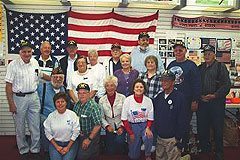
The Maine Troop Greeters4
Maine Troop Greeters have been welcoming flights into Bangor for four years now and according to their official website, they have greeted over 400,000 service members. Sgt. Cody Ruane, from Butte, Mont., was among them. After a very difficult year in Northern Baghdad, he arrived home for some much-needed R & R. His father, John Ruane, was grateful for the welcome given to his son by the people of Bangor.
“He went through some tough times,” his father said, “but the only thing that he ever asked me while he was there was, ‘Do the people of the U.S. support us?’” His question was answered in a big way when he witnessed the welcoming crowds gathered at the Bangor Airport.
“My son was just overwhelmed,” his father said.5
The Maine group worked out a system with the airport that informs them within hours of an arriving flight. They in turn activate their local phone chain so that no soldier arrives without someone there to say hello. Since Bangor is a refueling stop for planes both coming from and going to the war front, the Bangor group not only welcomes troops home but sends them off with a pat on the back.
A Call to Gratitude: Who Will Thank Our Heroes?
When Richard Wright of Hummelstown Penn., arrived into the airport, he called his father with a cell phone provided by the greeters. His father was impressed since that was the same group which was so friendly to his son when he departed for Iraq.
Nancy LaTourette’s son received the same treatment in 2005 when he returned from Iraq. After seeing a news program about The Maine Troop Greeters, her gratitude compelled her to drive to Bangor to experience the event herself. The 500 miles that separates her home from the Bangor Airport was no obstacle. Such is the effort which gratitude will take some people.
Supporting the Thirst for Heroism
In the last years of the Vietnam War, I was opening my eyes to life. Had I reached a mature age by then, I would have been horrified to know that American soldiers, who risked their lives fighting communists, would be spat upon by fellow Americans. That is the revulsion which such barefaced ingratitude causes me.
What causes enthusiasm for and gratitude to the American soldier is not the politics that are involved. I think it is the awe of seeing the disposition of the soldier who does not choose the scene of battle but is willing to make the sacrifice of his life for his country.
Although there are those who dislike the idea of this sacrifice, most Americans recognize the value of this offering and refuse to allow troops to be mistreated as they were during the Vietnam War. Americans who show up airports or give up first-class seats, do so because they see our soldiers are as worthy of our gratitude today as they were in the turbulent sixties.
Captain Thorpe told me that when she worked at Bethesda with wounded warriors she was moved by their selflessness. “The mantra of soldiers I dealt with was ‘I want to go back so we can finish what we started,’” she said, fighting back tears of admiration.
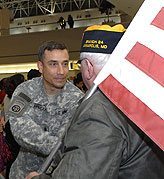
The gratitude showed towards them just happens to be another one of those paradoxes which exists “Only in America.” It is a paradox because as Americans we have all the creature comforts and distractions which should keep us mired in our consumerism. Yet our “boys” thirst for the heroism and sacrifice which combat provides. All the while their friends and families support them for doing so, while the ingrates are forced to keep a respectful silence.
Footnotes
- http://www.greatestjeneration.com/archives/week_2004_07_11.php.
- http://www.mysanantonio.com/news/military/stories/MYSA093007.01B.Stinson.3496521.html.
- “Soldiers Welcome” at http://www.youtube.com/watch?v= cwXo4PnTMYA.
- http://www.themainetroopgreeters.com/.
- Joni Averill, “Troops, Families Laud Bangor’s Airport Greeters,” Bangor Daily News, July 4, 2006.


